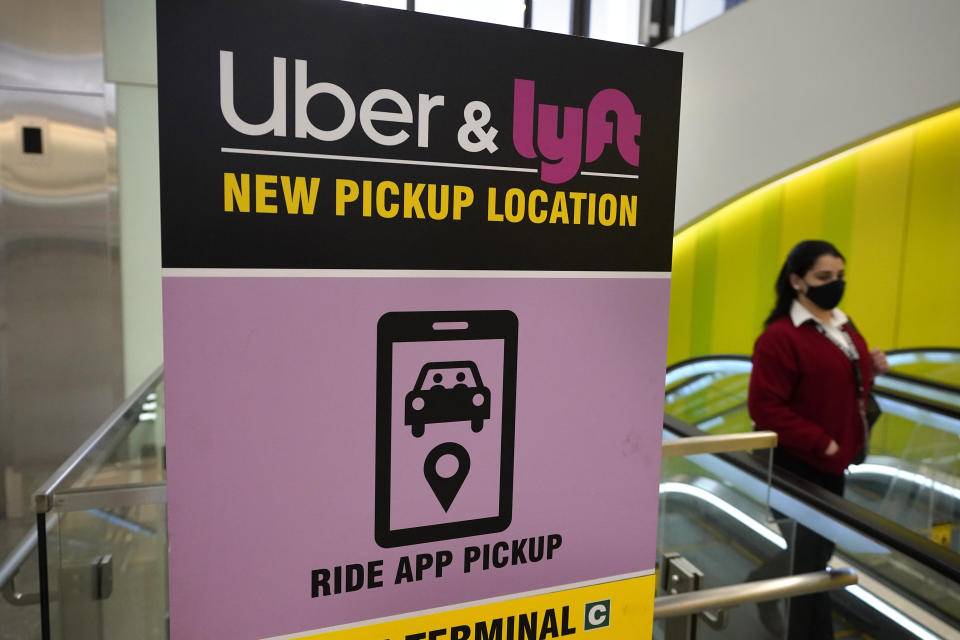
BOSTON (AP) — Drivers for Uber (Uber) and Lyft (LYFT) will earn a minimum wage of $32.50 an hour under a settlement announced Thursday by Massachusetts Attorney General Andrea Campbell in a deal that also includes a series of benefits and protections.
The two companies will also have to pay a total of $175 million to the state to resolve allegations that the companies violated Massachusetts wage and hour laws, the vast majority of which will be distributed to current drivers and elders.
Campbell said the agreement ends his office’s years-long litigation against the two companies and ends the threat of their attempt to rewrite the state’s employment law through a proposed ballot initiative in 2024 .
This issue would have resulted in drivers receiving inadequate protections and an income standard that did not guarantee minimum wage, she said.
“For years, these companies have underpaid their drivers and denied them basic benefits,” Campbell said in a written statement. “Today’s agreement holds Uber and Lyft accountable and provides their drivers, for the first time ever in Massachusetts, with a guaranteed minimum wage, paid sick leave, workers’ compensation insurance and health care benefits.
Democratic Gov. Maura Healey said the settlement provides “historic wages and benefits to right the wrongs of the past and ensure drivers are paid fairly in the future.”
In a statement, Lyft said the agreement resolves a lawsuit that recently went to trial and avoids the need for a referendum initiative campaign in November.
“More importantly, this is a major victory in a multi-year campaign by Bay State drivers to secure their right to remain independent, while still having access to new benefits,” the company said.
Uber also released a statement calling the deal “an example of what independent, flexible, and dignified work should look like in the 21st century.”
“By seizing this opportunity, we have addressed our historical responsibilities by building a new operating model that balances both flexibility and benefits,” the company said. “This allows Uber and Massachusetts to move forward in a way that reflects what drivers want and demonstrates to other states what is possible.”
The companies were pushing for a ballot question to be put to classify drivers as independent contractors eligible for certain benefits, but Campbell said the settlement ends the threat of the referendum question. A competing referendum question aims to give drivers the option right to unionize in Massachusetts.
Drivers will now receive one hour of sick leave for every 30 hours worked, up to a maximum of 40 hours per year. As part of the deal, Uber and Lyft must update their driver apps so that drivers can view and request their sick leave directly in the app. Drivers will also receive a stipend to enroll in the state’s Paid Family and Medical Leave program.

Under the agreement, Uber and Lyft will also allow drivers to combine their driving hours for both companies to obtain a health insurance benefit. Anyone driving more than 15 hours per week – for one or both companies – will be able to earn a health insurance benefit to pay for a Massachusetts Health Connector plan.
Drivers will be eligible for company-paid workers’ compensation insurance of up to $1 million to cover work-related injuries.
The agreement also requires companies to provide drivers with key information – about trip length, destination and expected earnings – before they accept a ride.
Companies are prohibited from discriminating against drivers based on race, religion, national origin, sex, sexual orientation, gender identity, disability or other protected identities – and cannot retaliate against drivers who file complaints against the companies with the Attorney General’s Office.
The agreement also requires companies to provide drivers with in-app chat support with a live person in English, Spanish, Portuguese and French and must provide drivers with information about why they were deactivated and create an appeals process.


